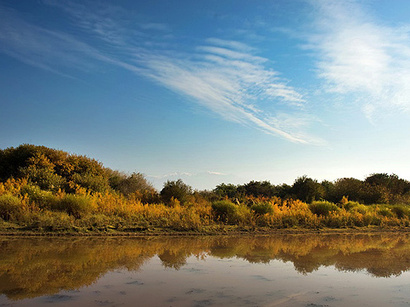Azerbaijan says no agreements on redirecting Araz River to Lake Urmia

By Seymur Aliyev
There are no agreements with Iran on redirecting the course of the Araz River to Lake Urmia, the Azerbaijani Deputy Minister of Environment and Natural Resources Firdovsi Aliyev said on Tuesday.
Azerbaijan itself suffers from a lack of water and in this regard the government acts on the basis of national interests, Aliyev said.
A project to direct 600 million cubic meters of water from the Araz River into Lake Urmia was launched during a visit of Iranian President Mahmoud Ahmadinejad and members of the government to Tabriz in 2010. It was planned to allocate $1.2 billion to implement this project.
"Azerbaijan has joined a number of international conventions in the environmental field and in this issue the country will act according to the requirements of these conventions," the deputy minister said. "Since this is a political issue, the Ministry of Ecology and Natural Resources passed its proposals to the Azerbaijani Foreign Ministry."
The chairman of the State Committee of Land and Cartography Garib Mammadov said the use of the waters of the Araz River to fill the shrinking Lake Urmia in Iran will have a negative impact on the environment of Azerbaijan.
"Changing the course of the Araz River cannot be a topic for discussion," he told Trend news agency on Tuesday. "It will negatively affect the areas along the river both from an environmental and agricultural point of view."
"Azerbaijan's water reserves are scarce, so a complete change of water course or reduction will significantly affect the regions located along the river," Garibov said.
Azerbaijan's position on this issue is clear and concrete, he added.
Earlier, Iran forwards a proposal to Azerbaijan to transfer water from Araz River in saving drying Lake Urmia.
Iran could benefit from Azerbaijan's assistance in saving its drying Lake Urmia. The country is expected to discuss with its neighbor use of the Araz River waters in an effort to replenish the basin, Jabbar Vatanfada, Director General of the Trans Boundary Rivers and Shared Water Resources Bureau under the Iranian Ministry of Energy, told IRNA news agency.
"It is planned to take some measures to prevent drying of Lake Urmia due to the climate conditions," Vatanfada said. "These measures include water transfer from the Araz River to Lake Urmia. We want the Azerbaijani government to provide its consent to this for the sake of neighborhood and assistance to environment [protection]."
According to official figures, some 70 per cent of Lake Urmia spanning 6,000 square kilometers is shallow. Currently, a liter of lake water contains up to 400 grams of salt. Previously, the amount of salt per liter of water was 160-170 grams.
The drying of the lake has an impact on the flora and fauna of the region, which alarms international organizations and regional countries.
The United Nations Development Programme (UNDP) has allocated $ 135 million to Iran to address environmental issues of the shoaling Lake Urmia.
"The main problem with Iran's lakes, including Lake Urmia, Parishan and Hamun and some others, is that much water of the rivers flowing into the lakes is used indiscriminately," Mohammad Javad Mohammadizadeh, who heads Iran's Environment Protection Organization, was quoted by Mehr news agency as saying. "This leads to their becoming shallow."
Protests were held in Tabriz and Urmia over the shoaling of Lake Urmia in 2011. Dozens of Iranian Azerbaijanis were arrested.
Lake Urmia in the northwestern tip of Iran is one of the largest permanent hypersaline lakes in the world and the largest lake in the Middle East. It extends as much as 140 km from north to south and is as wide as 85 km east to west during high water level periods.
Here we are to serve you with news right now. It does not cost much, but worth your attention.
Choose to support open, independent, quality journalism and subscribe on a monthly basis.
By subscribing to our online newspaper, you can have full digital access to all news, analysis, and much more.
You can also follow AzerNEWS on Twitter @AzerNewsAz or Facebook @AzerNewsNewspaper
Thank you!
